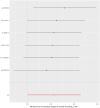The causal relationship between COVID-19 and increased intraocular pressure: A bidirectional two-sample Mendelian randomization study
- PMID: 36950097
- PMCID: PMC10025528
- DOI: 10.3389/fpubh.2023.1039290
The causal relationship between COVID-19 and increased intraocular pressure: A bidirectional two-sample Mendelian randomization study
Abstract
Background: Coronavirus disease 2019 (COVID-19) has brought great challenges to the global public health system and huge economic burdens to society, the causal effect of COVID-19 and intraocular pressure was blank.
Objective: This study aimed to explore the causal association between coronavirus disease (COVID-19) susceptibility, severity and criticality and intraocular pressure (IOP) by bidirectional Mendelian randomization (MR) analysis.
Materials and methods: Genetic associations with COVID-19 susceptibility, severity and criticality were obtained from the COVID-19 Host Genetics Initiative. Genetic associations with IOP were obtained from GWAS summary data. The standard inverse variance weighted (IVW) method was used in the primary assessment of this causality. Other methods were also implemented in supplementary analyses. Finally, sensitivity analysis was performed to evaluate the reliability and stability of the results.
Results: The results showed that COVID-19 susceptibility had null effect on IOP (β = 0.131; Se = 0.211; P = 0.533) as assessed by the IVW method. Moreover, the results revealed that COVID-19 severity, specifically, hospitalization due to COVID-19, had a positive effect on IOP with nominal significance (β = 0.228; Se = 0.116; P = 0.049). However, there were null effect of COVID-19 criticality on IOP (β = 0.078; Se = 0.065; P = 0.227). Sensitivity analysis showed that all the results were reliable and stable. The reverse MR analysis revealed that there was null effect of IOP on COVID-19.
Conclusions: We demonstrated that hospitalization due to COVID-19 might increase IOP; therefore, greater attention should be given to monitoring IOP in inpatients with COVID-19.
Keywords: COVID-19; Mendelian randomization; criticality; intraocular pressure; severity; susceptibility.
Copyright © 2023 Lin, Jiang, Cai, Luo, Zheng, Zhu, Lin, Tang, Li and Xie.
Conflict of interest statement
The authors declare that the research was conducted in the absence of any commercial or financial relationships that could be construed as a potential conflict of interest.
Figures





Similar articles
-
Using genetic variants to evaluate the causal effect of serum vitamin D concentration on COVID-19 susceptibility, severity and hospitalization traits: a Mendelian randomization study.J Transl Med. 2021 Jul 10;19(1):300. doi: 10.1186/s12967-021-02973-5. J Transl Med. 2021. PMID: 34246301 Free PMC article.
-
The lack of causal link between myopia and intraocular pressure: Insights from cross-sectional analysis and Mendelian randomization study.Photodiagnosis Photodyn Ther. 2024 Oct;49:104334. doi: 10.1016/j.pdpdt.2024.104334. Epub 2024 Sep 14. Photodiagnosis Photodyn Ther. 2024. PMID: 39284400
-
Estimating causal effects of atherogenic lipid-related traits on COVID-19 susceptibility and severity using a two-sample Mendelian randomization approach.BMC Med Genomics. 2021 Nov 13;14(1):269. doi: 10.1186/s12920-021-01127-2. BMC Med Genomics. 2021. PMID: 34774031 Free PMC article.
-
Causal association of epigenetic aging and COVID-19 severity and susceptibility: A bidirectional Mendelian randomization study.Front Med (Lausanne). 2022 Sep 23;9:989950. doi: 10.3389/fmed.2022.989950. eCollection 2022. Front Med (Lausanne). 2022. PMID: 36213637 Free PMC article. Review.
-
Genetic predisposition to COVID-19 may increase the risk of hypertension disorders in pregnancy: A two-sample Mendelian randomization study.Pregnancy Hypertens. 2021 Dec;26:17-23. doi: 10.1016/j.preghy.2021.08.112. Epub 2021 Aug 19. Pregnancy Hypertens. 2021. PMID: 34428710 Review.
Cited by
-
Uso de inteligencia artificial en la predisposición genética a enfermedad crítica por COVID-19: evaluación comparativa de modelos de aprendizaje automático.Adv Lab Med. 2025 Apr 2;6(2):190-198. doi: 10.1515/almed-2024-0129. eCollection 2025 Jun. Adv Lab Med. 2025. PMID: 40438555 Free PMC article. Spanish.
-
Use of artificial intelligence to assess genetic predisposition to develop critical COVID-19 disease: a comparative study of machine learning models.Adv Lab Med. 2025 May 5;6(2):181-189. doi: 10.1515/almed-2025-0073. eCollection 2025 Jun. Adv Lab Med. 2025. PMID: 40438551 Free PMC article.
References
Publication types
MeSH terms
LinkOut - more resources
Full Text Sources
Medical

